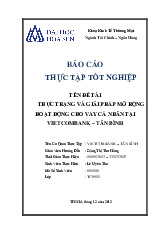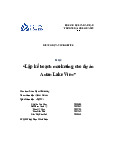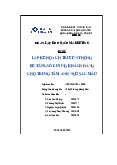



















Preview text:
Lecture 4 Ethics and Privacy Information Security Objectives
• Define ethics, list and describe the three fundamental tenets of ethics,
and describe the four categories of ethical issues related to information technology.
• Identify three places that store personal data, and for each one,
discuss at least one potential threat to the privacy of the data stored there.
• Identify the five factors that contribute to the increasing vulnerability of
information resources, and provide a specific example of each one.
• Compare and contrast human mistakes and social engineering, and
provide a specific example of each one.
• Discuss the 10 types of deliberate attacks • Ref.: Chapter 3 & 4
Faculty of Economics and Business Introduction to MIS 2 Ethical Issues
• Ethics refers to the principles of right and wrong
that individuals use to make choices that guide their behavior
• There are many frameworks that can help us make ethical decisions • Ethical Frameworks
• Ethics in the Corporate Environment
• Ethics and Information Technology
Faculty of Economics and Business Introduction to MIS 3 • Ethical Frameworks 4 standards 5 steps Utilitarian approach • Recognize an ethical Rights approach issue Fairness approach • Get the facts
Common good approach • Evaluate alternative actions • Make a decision and test it • Act and reflect on the outcome of your decision
Combine these 4 standards by these 5 steps to develop a general
framework for ethics (or ethical decision making)
Faculty of Economics and Business Introduction to MIS 4 • Four standards
• The utilitarian approach states that an ethical
action is the one that provides the most good or does the least harm
• The rights approach maintains that an ethical
action is the one that best protects and respects
the moral rights of the affected parties
• The fairness approach posits that ethical actions
treat all human beings equally, or, if unequally, then
fairly, based on some defensible standard.
• the common good approach highlights the
interlocking relationships that underlie all societies
Faculty of Economics and Business Introduction to MIS 5
• If we combine these four standards, we can develop a general
framework for ethics (or ethical decision making). This framework consists of five steps:
• Recognize an ethical issue:
• Could this decision or situation damage someone or some group?
• Does this decision involve a choice between a good and a bad alternative?
• Does this issue involve more than simply legal considerations? If so, then in what way? • Get the facts:
• What are the relevant facts of the situation?
• Do I have sufficient information to make a decision?
• Which individuals and/or groups have an important stake in the outcome?
• Have I consulted all relevant persons and groups?
Faculty of Economics and Business Introduction to MIS 6
• Evaluate alternative actions:
• Which option will produce the most good and do the least harm? (the utilitarian approach)
• Which option best respects the rights of all stakeholders? (the rights approach)
• Which option treats people equally or proportionately? (the fairness approach)
• Which option best serves the community as a whole, and not just some
members? (the common good approach)
• Make a decision and test it:
• Considering all the approaches, which option best addresses the situation?
• Act and reflect on the outcome of your decision:
• How can I implement my decision with the greatest care and attention to
the concerns of all stakeholders?
• How did my decision turn out, and what did I learn from this specific situation?
Faculty of Economics and Business Introduction to MIS 7
• Ethics in the Corporate Environment:
• A code of ethics is a collection of principles
intended to guide decision making by members of the organization
Faculty of Economics and Business Introduction to MIS 8
• Fundamental tenets of ethics:
• Responsibility means that you accept the
consequences of your decisions and actions.
• Accountability refers to determining who is
responsible for actions that were taken.
• Liability is a legal concept that gives individuals
the right to recover the damages done to them by
other individuals, organizations, or systems.
Faculty of Economics and Business Introduction to MIS 9
• Ethics and Information Technology PAPA
Faculty of Economics and Business Introduction to MIS 10




